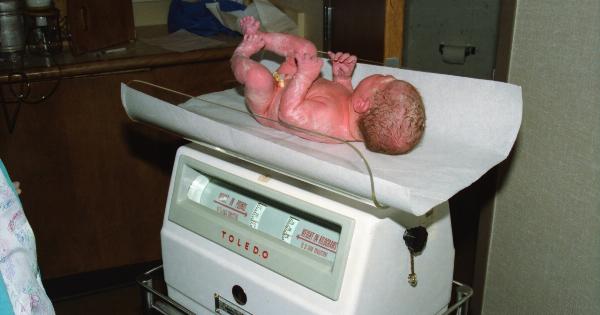Welcoming a new baby into your family is an exciting and joyous time. As a parent, it is normal to feel concerned about your baby’s growth and development. One of the key aspects of your baby’s health is their weight and growth.
In this guide, we will provide you with valuable information and helpful tips on monitoring your baby’s weight and ensuring their healthy growth.
Understanding Healthy Growth Patterns
Every baby is different, and their growth patterns may vary. However, there are general guidelines that can help you understand whether your baby is growing and developing within a healthy range.
In the first year, infants usually go through rapid growth, with their weight roughly doubling by the time they are four to six months old.
Monitoring Your Baby’s Weight
Weight is one of the crucial indicators of your baby’s overall health and growth. Regular weight checks can provide valuable insights into your baby’s progress.
Your pediatrician will measure and plot your baby’s weight on growth charts commonly used healthcare professionals.
Interpreting Growth Charts
When looking at growth charts, it is essential to understand the percentile system. The percentile shows how your baby’s weight compares to peers of the same age and gender.
For instance, if your baby is in the 60th percentile for weight, it means they weigh more than 60% of other babies in the same age group. Remember that being in a higher or lower percentile does not necessarily indicate a health problem, as long as your baby is consistently following their own growth curve.
Formula Feeding vs. Breastfeeding
It is common for parents to wonder if the choice between breastfeeding and formula feeding affects their baby’s weight and growth. Breast milk is nature’s perfect food for infants, providing all the necessary nutrients and immune support.
Breastfed babies tend to have a slower but steady growth rate. Formula-fed babies, on the other hand, may gain weight more rapidly. Both options can be healthy, as long as your baby is gaining weight and growing proportionately.
Ensuring Adequate Nutrition
Regardless of whether you breastfeed or use formula, it’s important to ensure your baby receives adequate nutrition for healthy growth.
If you have any concerns about your baby’s weight or if they are not meeting their developmental milestones, consult with your pediatrician. They may recommend adjusting feeding schedules, increasing or decreasing the quantity, or introducing solid foods depending on your baby’s age.
Introducing Solid Foods
Around six months of age, your baby may be ready to start solid foods. This is an exciting milestone, but it’s important to introduce foods gradually and appropriately.
Begin with single-ingredient purees such as mashed fruits or vegetables, and keep an eye out for any allergic reactions. Consult your pediatrician for specific recommendations and guidelines for introducing solids to ensure your baby’s nutrition and growth continue without any issues.
Promoting Healthy Weight Gain
Along with adequate nutrition, there are several ways you can promote healthy weight gain in your baby. It’s crucial to nurture a positive feeding environment by offering a variety of healthy foods when they are developmentally ready.
Avoid force-feeding or pressuring your baby to finish their meals. Encourage self-regulation and listen to their hunger and fullness cues.
Understanding Growth Spurts
Growth spurts are periods during which your baby experiences rapid growth and increased hunger. These spurts can occur at different times for each baby but are commonly seen around seven to ten days, three weeks, six weeks, three months, and six months.
During these periods, your baby may want to feed more frequently to meet their accelerated nutritional needs. It is important to trust your baby’s instincts and provide additional feeds if required.
Factors Affecting Growth
While genetics play a significant role in your baby’s growth, certain external factors can influence their weight and development. Environmental factors, such as exposure to secondhand smoke, can impact your baby’s growth negatively.
Conversely, a nurturing and stimulating environment with plenty of interaction and playtime can contribute positively to their overall development.
When to Be Concerned
While every baby grows at their own pace, there are certain red flags that may indicate a potential problem.
If your baby consistently falls off their growth curve or shows signs of inadequate weight gain, it is important to consult with your pediatrician. Other concerning signs include a lack of appetite, lethargy, excessive fussiness, or delays in achieving developmental milestones.
Celebrate Each Milestone
Remember to celebrate your baby’s growth and milestones along the way. Each baby is unique, and they will grow and develop at their own pace. Comparing your baby to others can lead to unnecessary stress.
Give your baby love, attention, and a nurturing environment, and enjoy the incredible journey of watching them grow into their own unique individual.




























